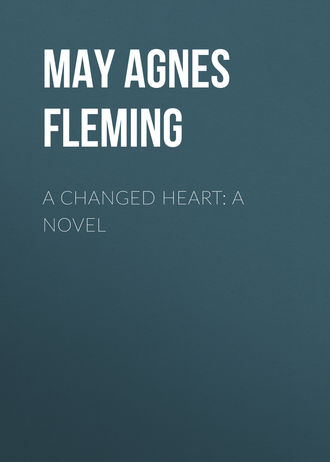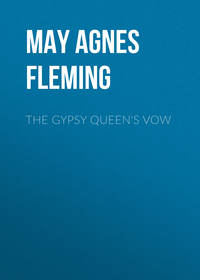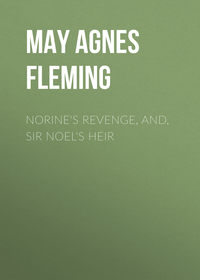 полная версия
полная версияA Changed Heart: A Novel
"Come and sing us a song, Laura – that's a good girl," he said, while Val, making an apology, slipped out. "Come and sing 'The Laird o' Cockpen.'"
Miss Blair, all smiles, took her seat, and sung not only "The Laird o' Cockpen," but a dozen others of the same kidney.
"What do you think of that?" inquired Miss Blair, triumphantly rising up, with a finishing bang. "Who says I can't sing? Now, Miss Rose, you sing, I know."
"Of course she does," said Charley. "Miss Rose, permit me to lead you to the instrument."
Miss Rose looked as though she were about to excuse herself, but that impulsive Laura Blair ran over and caught her by both hands.
"Up with you! We won't take any excuses. Charley, the young lady is at your mercy, lead her off."
Charley promptly did so. Miss Rose, smiling graciously, ran her white fingers over the yellow keys, and looked up at him.
"What shall I sing, Monsieur?"
"Anything you please, Mademoiselle. I am prepared to be delighted with 'Old Dan Tucker,' if you chose it."
The white fingers still ran idly over the keys, breaking into a plaintive prelude at last, and in a voice, "low and sweet" as Annie Laurie's own, the song began. The words were those of a gifted young American poetess; the melody, a low sweet air, in a melancholy minor key – Miss Rose's own, perhaps.
The sweet voice faltered a little toward the close; but as a buzz of congratulation ran around the circle she arose hastily. Arose to find herself face to face with two gentlemen who had entered as she began her song, and who had stood silently listening with the rest. It was Captain Cavendish and Val; and the young officer's face wore a look no one in that room had ever seen it wear before – a pale and startled look of anxiety, almost of fear – and as she faced them he backed a few paces involuntarily. Miss Rose, evidently taken completely by surprise, started visibly, growing white and red by turns. But Val was introducing them, and only he and one other present saw the changing faces of the twain. That other was Miss Catty Clowrie, whose eyes were as keen as any other cat's, and who watched them furtively, with vividest interest. Miss Catty was enough of a mathematician to know there is no effect without a cause. What, then, was the cause of this? It was easily enough answered. Captain Cavendish and Miss Rose had met before, and had known each other well, though they were now bowing as perfect strangers. The elegant officer had recovered all his high-bred sangfroid, and was smooth and bland as sweet oil; but Miss Rose's face had settled into so deadly a pallor that Mrs. Marsh, albeit not the most eagle-sighted in the world, noticed it.
"Dear me, Miss Rose, how pale you are! Aren't you well?"
Miss Rose murmured something about the heat, and subsided into the most shadowy corner she could find; and Charley created a diversion by sitting down to the piano himself and rattling off a jingling symphony.
In the midst of it carriage wheels rolled up to the door of No. 16, and the first-floor bell rang loudly a minute after.
"That's Natty," said Charley.
Miss Jo met her in the hall and escorted her to her bedroom, which was the dressing-room for the evening; and presently Miss Nathalie came in, dressed in black silk, trimmed with black lace, and all her beautiful golden hair falling in glittering ringlets over her shoulders, her cheeks glowing with the rapid ride through the night air. Brilliant she looked; and Captain Cavendish's heart, or whatever the thing is that does duty for a heart with men of the world, quickened its beating a little, as he shook hands. Nathalie kissed Miss Rose, sitting so very still in her quiet corner.
"My pale little girl! Here you sit like a white shadow, all by yourself. Charley, what on earth are you shouting there?"
"Now, Natty, it's your turn," said Miss Jo.
"Here's the cards," said Charley, laying hold of a pack. "While Natty's singing we'll play 'Muggins.' Does anybody here know 'Muggins'?"
Nobody did.
"What a disgrace! Then I'll teach you. Miss Jo, I'll sit beside you. Come along, captain; here Laura, Catty, Val, mother; Miss Rose, won't you join us?"
"Don't, Miss Rose," said Natty, who was playing a waltz. "They're nothing but a noisy set. Come here and sing with me."
Natty sung everything – Italian arias, French chansonettes, German and Scotch ballads; her full, rich soprano voice filling the room with melody, as on Sundays it filled the long cathedral aisles. Natty's voice was superb – Miss Rose listened like one entranced. So did another, Captain Cavendish, who made all sorts of blunders in the game, and could not learn it at all, for watching the two black figures at the piano – the little pale girl with the modest brown braids, and the stately heiress with her shining yellow curls. Catty Clowrie watched them and the captain, and the game too, noting everything, and making no mistakes. A very noisy party they were, every one laughing, expostulating, and straining their voices together, and Charley winning everything right and left.
"I say, Cavendish, old fellow! what are you thinking of?" cried Val. "This is the third time I've told you to play."
Captain Cavendish started into recollection, and began playing with the wildest rapidity, utterly at random.
"Look here, Natty," called Charley, as the card-party, more noisy than ever, broke up; "I say it's not fair of you to monopolize Miss Rose all the evening. Here's Captain Cavendish has lost all his spare change, because he couldn't watch the game for watching that piano."
Miss Rose retreated hastily to her corner; Natty wheeled round on the piano-stool.
"What noise you have been making. Have you finished your game?"
Charley jingled a pocketful of pennies – Speckport pennies at that – as large as quoits.
"Yes, we have finished, for the simple reason I have cleaned the whole party completely out, and I have won small change enough to keep me in cigars for the next two months. Who's this?"
"It's somebody for me," said Natty, starting up; "that's Rob Nettleby's knock."
"Don't go yet, Natty," said Val, "it is too early."
"It is half-past ten; I should have been off half an hour ago. Miss Blake, my things, please."
Miss Jo produced a white cloud and large cloak, and Natty's move was a signal for all to depart. Catty, Laura, Miss Rose, and Mrs. Marsh's mufflings had to be got, and the little parlor was a scene of "confusion worse confounded."
Val strolled over to where Captain Cavendish was making himself useful, helping Miss Marsh on with her cloak.
"Natty, I'll go home with you, if you like," said polite Val; "it will be rather a dismal drive up there with no one but Rob Nettleby."
"Mr. Blake is forestalled," said Captain Cavendish, coolly. "Miss Marsh has accorded the honor to me."
"All right," said Val, "I'll go home with Laura Blair, then. Charley can take care of the other three, for Catty lives next door."
Lady Leroy's carryall, with Cherrie Nettleby's elder brother for driver, was waiting at the door. Good-byes were said, Natty kissed her mamma, Laura and Miss Rose, but only shook hands with Miss Clowrie. Captain Cavendish noticed the omission as he seated himself beside her, and they drove off.
"I don't like her," said Natty; "I never did, since I was a child. She was such a crafty, cunning little thing in those days – a sort of spy on the rest of us – a sort of female Uriah Heep."
"Is she so still?"
"Oh, no; she is well enough now; but old prejudices cling to one, you know. I don't like her, because I don't like her – an excellent female reason, you understand."
"Does your brother share your prejudices, Miss Marsh?" asked the young officer, with a meaning smile.
"Charley? I don't know. Why?"
"Because I fancy the young lady is rather disposed to regard him with favor. I may be mistaken, though."
Natty suddenly drew herself up.
"I think you are mistaken, Captain Cavendish. Catty Clowrie has sense, whatever else she may lack, and never would dream of so preposterous a thing."
"Pardon! it has been my mistake, then. You seem to be all old friends in this place."
"Oh," said Natty, with her gay laugh, "every one knows every one else in Speckport, and a stranger is a marked being at once. Apropos of strangers, what a perfect darling that Miss Rose is."
"How very young-ladylike! Miss Rose does not sound like a family name; has she no other cognomen?"
"Her letter to me was signed W. Rose. I don't know what the 'W' is for. I think she has the sweetest face I ever saw."
"What a lovely night it is?" was Captain Cavendish's somewhat irrelevant answer; and had the moon been shining, Natty might have seen the flush his face wore. Perhaps it was the sea-breeze, though; for it was blowing up fresh and bracing, and a host of stars spangled a sky of cloudless blue. The monotonous plash of the waves on the shore came dully booming over the rattle of their own carriage-wheels.
"What are the wild waves saying? Miss Rose and I have a bond of sympathy between us: we both love the sea. I suppose," said Natty, going off into another subject, "Mrs. Leroy will read me a lecture for my long stay, when I get back."
"Will she not be asleep?"
"Asleep? No, indeed; I believe if I staid out for a week she would never close an eye until I got back."
"Is she so very fond of you, then?"
"It is not that; though I think she is as fond of me as it is in her nature to be of anything, except," with another laugh, "eating and money. It is fear that keeps her awake; she dreads being left alone."
"Why? Not from an evil conscience, I trust."
"For shame, sir. No, she always keeps a large sum of money in her chamber – you saw that queer cabinet – well, in that; and she is terribly scared of robbers, in spite of all our bolts and bars."
"She should not keep it about her, then."
"Very true; but she will. I sleep in the room next hers, and I presume she feels my presence there a sort of safeguard against burglars. In Midge she has no confidence whatever."
"And yet I should consider Midge the greatest possible safeguard. The sight of her might scare away an army of robbers."
"Now, now!" cried Natty. "I shall not have Midge abused. She is the most faithful and trustworthy creature that ever lived."
"Perhaps so; but you will own that she is not the most lovely. When I was a boy at Eton, I used to read German legends of beautiful princesses guarded by malignant spirits, in uncouth human forms. I thought of the stories this morning when I was at Redmon."
"That's a compliment, I suppose," said Natty, "but I don't relish compliments, I can tell you, at Midge's expense. Here we are at the cottage."
"What cottage is it?" Captain Cavendish asked, forgetting suddenly that he had spent half an hour there that very morning.
"The Nettlebys. The father is our gardener; the sons, the whole family, make themselves useful about the place, all but Cherrie, who is more for ornament than use. Here we are at Redmon, and there is the light burning in Mrs. Leroy's window."
"Does it burn all night?" he asked, looking up at it.
"No; it is a beacon for me. I must go to her room the first thing now, give an account of myself, and extinguish it. Good-night; I hope you will enjoy your solitary journey back."
"I shall have pleasant thoughts of a lady fair to keep me company. Are you sure you can get in?"
"Midge is opening the door now; once more, good-night."
Waving her hand to him, she was gone while she spoke. Midge stood blinking in the doorway, holding a candle above her head, which tar-mop was now tied up in a red flannel petticoat.
She shaded her eyes with her hand, peering out at the tall figure in the loose overcoat; and when she made sure of his identity, slamming the door to with a bang that left no doubt of her feelings toward him.
"Midge, why did you do that?" Natty said, reprovingly.
"Because I never want to see his wicked face here, Miss Natty; that's why!" cried Midge, shrilly; "and I don't want to see him with you, for he is a villain, and he will turn out one, if he was ten officers, ten times over."
But Natty was flying up the polished stairs with a new happiness at her heart, singing as she went a snatch of "Love's Young Dream."
CHAPTER VII.
TOO MANY IRONS IN THE FIRE
Mr. Val Blake was a young gentleman possessing a great many admirable virtues, among others the fearful one of always saying what he thought. Another, not quite so terrible to society, was that of early rising. The sun, whenever that luminary condescended to show its face in Speckport, which wasn't so very often, never found him in bed, either winter or summer. Val might be up until two o'clock in the office, as he sometimes was in busy seasons, such as election times, but that never prevented his rising at half-past four the next morning, as bright as a new penny.
Val had escorted Miss Laura Blair home from his sister's little sociable – not only escorted her home, in fact, but had gone in with her. It was past eleven then, but Papa Blair had invited him to blow a friendly cloud, and Val had accepted the invitation. There they sat, smoking and talking politics until after one, and it was half-past when he got back to No. 16 Great St. Peter's Street; but for all that, here he was next morning at the hour of six, coming striding along the sea-shore, a pipe in his mouth, and a towel in his hand. Val had been taking a sea-bath, his invariable custom every fine morning, from the first of May to the last of October, to the alarming increase of his appetite for breakfast. There were few to be met on the sand, at that hour, except in the fishing seasons; and the fishermen not being in yet from the night's work, the shore was entirely deserted. The editor of the Speckport Gazette had not the shore all to himself after all; for, as he passed a jutting bowlder, he came in view of a fluttering figure walking slowly on before. The black dress waving in the breeze, the slender form in the long black mantle, the little straw hat, and the brown braid were familiar by this time.
Miss Rose, the pretty little school-teacher, was taking an early constitutional as well as himself, with a book for her only companion. Val's long legs were beginning to measure off the sand in vast strides, to join her, when he was forestalled most unexpectedly. Starting up from behind a tall rock, in whose shadow on the warm sand he had been lying, his hat pulled over his eyes to protect him from the sun, a gentleman came forward, lifted his hat, and accosted her. Val knew the gentleman quite as well as he did the lady, and stopped. At the sound of his voice coming so suddenly, she had recoiled with a suppressed cry, but at sight of whom it was, she stood perfectly still, as if transfixed.
There was a path up the hillside – the very path Captain Cavendish had been shown by the young Nettlebys the day before. Val turned up this, with his hands in his pockets, and his mind in a state of soliloquy.
"I'm not wanted, I expect; so I'll keep clear! There's something queer about this – they were both taken aback last night, were they not? She's a pretty little thing, and he's been in Montreal, I know; was quartered there before he was ordered to Halifax. I suppose it's the old story – he always was a flirt, and his handsome face sets the girls loony wherever he goes. Miss Rose looks sensible, but I dare say she's as bad as the rest."
Val's suspicions might have become certainty had he been listening to the conversation of the young officer and the little school-teacher; but there was no one to listen, except the waves and the wind, and the seagulls clanging over their heads.
"Winnie!" Captain Cavendish was hurriedly saying, "I knew you would be here, and I have been waiting for the past half hour. No, do not go! Pray stay and hear me out."
"I must go!" Miss Rose said, in a violent tremor and agitation. "You have nothing to say to me, Captain Cavendish. I cannot be seen here with you."
"There is no one to see us – the shore is deserted! Winnie! you must stay."
She had turned to go; but he caught her hand, his own face pale as hers had turned.
"Let go my hand, sir!" she cried, in so peremptory a tone that he dropped it at once; "every word you speak to me is an insult! Let me go!"
"Only one moment, Winnie."
Again she interposed, her eyes quite flashing.
"Have the goodness, Captain Cavendish, to be a little less familiar; to cease calling me Winnie."
"What shall I call you, then?" he said, with a strange look, "Miss Rose?"
She turned away, and made a little passionate gesture with her hand.
"You have no right to call me anything – to speak to me at all! I do not know what evil fate has driven us together here; but if you have one feeling of honor, Captain Cavendish, you will leave me in peace – you will let me alone. My lot is not such a happy one that you should wish to destroy the little comfort I have left."
Her voice choked and something fell on her book and wet it. The face of the English officer looked strangely moved for him.
"Heaven knows, Winnie, I have no desire to disturb it; I have been a villain – we both know that – but destiny was against me. I am poor; I am in debt – I was then – what could I do?"
"Will you let me go?" was her answer, without turning her averted face to him.
"Am I, then, utterly hateful to you?" he asked, with some bitterness. "You have soon forgotten the past, but I deserve it! I do not ask what chain of circumstances brought you here; I only ask, being here, that you will not reveal the story of – of what is past and gone. Will you promise me this, Winnie?"
"What right have you to ask any promise of me?" she demanded, her gentle voice full of indignation.
"Very little, I know; but still, I want the promise, Winnie, for your own sake, as well as for me."
"I am not likely to tell; the story of one's own folly is not too pleasant to repeat. And now, in return, Captain Cavendish, I want, I demand, a promise from you! We met last night as strangers, as strangers let us meet henceforth. Go your own way. I shall not molest you, never fear; and be generous enough to grant me the same favor. My life is to be one of hard work. I do not regret that. Let me find happiness in my own way, and do not disturb me any more."
"And it has all come to this!" he said, moodily, looking out over the wide sea. "Well, Winnie, let it be as you wish, only I never thought you could be so unforgiving."
"I have forgiven long ago; I want to try and forget as well!"
She walked rapidly away. Only once had she looked at him all the time – after that first glance of recognition, her face had been averted.
Captain Cavendish watched her out of sight, took two or three turns up and down the sand, and then strolled away to his lodgings. His rooms were in the Speckport House, fronting on Queen Street; and after disposing of his beefsteak and coffee with a very good appetite, he seated himself near an open window, to smoke no end of cigars and watch the passers-by.
A great many passers-by there were, and nearly all strangers to him; but presently, two young men went strutting past, arm-in-arm, and, chancing to look at his window, lifted their hats in passing. A sudden thought seemed to flash through the officer's mind as he saw them, and, seizing his hat, he started out after them. It was young McGregor and Charley Marsh, and he speedily overtook them.
"I have been sitting there for over half an hour," he said, taking Charley's other arm, familiarly, "watching society go by, and you two were the first I knew. Being tired of my own company, I thought I would join you. Have a cigar?"
"You find Speckport rather slow, I suppose?" said Charley, lighting his weed. "I should myself, if I had nothing to do."
"Oh, I am used to it; and," with a droll look, "I have discovered there is more than one pill to kill time, even in Speckport."
"Already! where do you mean?"
"Prince Street, for instance."
Charley laughed, and young McGregor smiled.
"You go there, do you? Well, I have lived all my life in Speckport, but I have never set foot over the threshold you mean, yet."
"Nor I," said young McGregor. "By George, wouldn't the old man look half-a-dozen ways at once if he thought I would dare look at it twice."
There was a smile on Captain Cavendish's face, half of amusement, half of contempt.
"I am going there now, and was about asking you to accompany me for an hour's amusement. Come on, better late than never."
Charley hesitated, coloring and laughing, but McGregor caught at the invitation at once.
"I say, Marsh, let us go! I've always wanted to go there, but never had a chance without the governor finding it out, and kicking up the deuce of a row!"
"I have the entree," said Captain Cavendish; "no one will be the wiser, and if they should, what matter? It is only to kill time, after all."
But still Charley hesitated, half laughing, half tempted, half reluctant. "That is all very well from Captain Cavendish, nephew of a baronet, and with more money than he knows what to do with; but it's of no use going to that place with empty pockets, and medical students, it is proverbial, never have anything to spare. No, I think you must hold me excused."
"Oh, confound it, Charley," exclaimed McGregor, impatiently, "I'll lend you whatever you want. Fetch him along, captain; what he says is only gammon."
"Perhaps," said the captain, with a cynical smile, "Mr. Marsh has conscientious scruples – some people have, I am told. If so – "
He did not finish the sentence, but the smile deepened. That mocking smile did more to overthrow Charley's resolution than any words could have done. He turned at once in the direction of Prince Street: "The only scruples I know anything about relate to weights and measures, and I believe these are in a dram. I have a couple of hours before dinner; so until then, I am at your service, captain."
The trio turned into Prince Street – a quiet street, with staid rows of white houses, and only one of any pretension, at one of its quiet corners. Captain Cavendish ran up the steps, with the air of a man perfectly at home, opened the outer door and rang the bell. There were few people passing, but Charley and McGregor glanced uneasily about them, before going in, and closed the street door after them with some precipitation.
Charley had told the captain he was at his service for two hours, but over four passed before the three issued forth again. Charley looked flushed, excited, and in high spirits, so did Alick McGregor; but Captain Cavendish, though laughing, was a trifle serious, too. "I had no idea you were such an adept, Mr. Marsh," he was saying, "but you must give me my revenge. Better luck next time."
"All right," said Charley, in his boyish way, "whenever you like, now that the ice is broken. What do you say, Mac?"
"I'm your man. The sooner the better, as I intend keeping on until I make a fortune on my own account. Would not the governor stare if he knew the pile I made this morning."
As they passed into Queen Street, the town clock struck three. Charley looked aghast.
"Three o'clock! I had no idea it was two. Won't they be wondering what has become of me at home. I feel as though I should like my dinner."
"Dine with me," said the captain; "I ordered dinner at half-past three, and we will be in the nick of time."
The two young Speckportians accepted the invitation, and the three went up crowded Queen Street together.
Streaming down among the crowd came Miss Cherrie Nettleby. One kid-gloved hand uplifted her silken robe, and displayed an elaborately embroidered under-skirt to the admiring beholder; the other poised a blue parasol; and, gorgeous to behold, Miss Nettleby flashed like a meteor through Speckport. All the men spoke to her – all the women turned up their fair noses and sailed by in delicate disdain. Charley blushed vividly at sight of her.
"Don't blush, Charley," drawled young McGregor, "it's too young-lady-like, but I suppose you can't help it any more than you can being in love with her. Good afternoon, Miss Cherrie."
Miss Cherrie smiled graciously, made them a bow that ballooned her silk skirt over the whole sidewalk, and sailed on. Charley looked as if he should like to follow her, but that was next to impossible, so he walked on.






